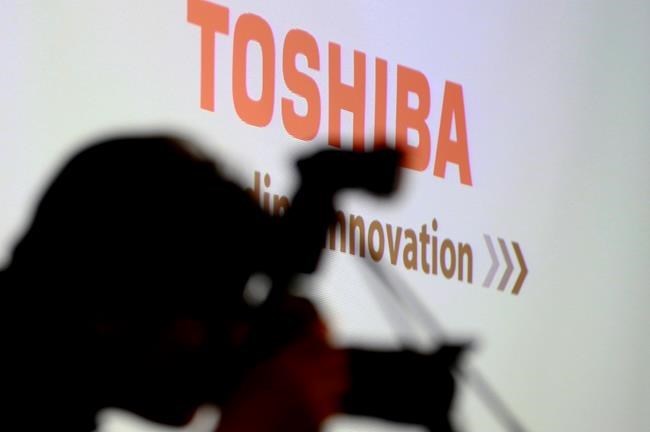
FILE - In this April 11, 2017, file photo, a photographer is silhouetted before a press conference at the Toshiba Corp. headquarters in Tokyo. The heads of Toshiba's memory chip business and Bain Capital, the investment fund buying it, said Friday, Oct. 13, 2017, they hope to close the deal by March despite persisting opposition from Toshiba's U.S. joint venture partner Western Digital. (AP Photo/Shizuo Kambayashi, File)
Republished October 12, 2017 - 11:42 PM
Original Publication Date October 12, 2017 - 10:31 PM
YOKKAICHI, Japan - The heads of Toshiba's memory chip business and Bain Capital, the investment fund buying it, said Friday they hope to close the deal by March despite persisting opposition from Toshiba's U.S. joint venture partner Western Digital.
Appearing with Toshiba Memory Chief Yasuo Naruke, Bain Japan chief Yuji Sugimoto said his consortium is giving full support to the plan.
Toshiba Memory and Bain gave a media tour Friday of a flash-memory chip manufacturing plant in this central Japanese industrial town to highlight the chip unit's technological prowess and business potential.
Tokyo-based Toshiba Corp., suffering massive losses from its nuclear business, sorely needs the sale to survive. Its U.S. nuclear operations at Westinghouse Electric Co. filed for bankruptcy earlier this year.
Toshiba spun off the memory business in July for the sale. It's the last major asset Toshiba has left to sell.
"Please check out how energetic we are at Yokkaichi," Naruke told reporters.
He said channels for talks were open with Western Digital, and he hoped for cordial relations and continued co-operation with the company in product development and investments.
The plant in Yokkaichi, Mie Prefecture, 290 kilometres (180 miles) southwest of Tokyo, is at the centre of the squabble between Bain and U.S. joint venture partner Western Digital. It makes highly lucrative SanDisk memory chips — the business Toshiba has agreed to sell to a consortium headed by investment company Bain Capital for 2 trillion yen ($18 billion).
Western Digital has filed in U.S. arbitration court in San Francisco to block the sale. The litigation is likely to take years but a decision is expected soon on whether the sale would be suspended pending resolution of the case.
Western Digital has especially objected to South Korean rival SK Hynix's involvement in the consortium buying Toshiba Memory. The consortium has said that intellectual property will not leak to Hynix, which is investing 395 billion yen ($3.5 billion) but doubts remain.
Western Digital said earlier this week that Bain has not contacted it and the two companies are not in talks. Bain declined comment on the denial.
The Bain-led consortium aims to list the NAND flash-memory SanDisk joint venture business on the Tokyo Stock Exchange within several years, Sugimoto said. He has pledged to protect jobs at the memory business, noting that the basic management there now will stay. New workers will be hired to keep up with technological advances, he said.
Competition from Samsung of South Korea, which is No. 1 in the memory chip field, is a major threat, Sugimoto said, and not falling behind in technology remains critical.
Kota Ezawa, a financial analyst with Citigroup Global Markets in Tokyo, says selling the memory business is crucial for Toshiba, although it could sought a better price. He also believes Western Digital might be largely bluffing so it doesn't lose control over the joint venture and can maintain the business' value and prevent damage to its own bottom line.
"What the arbitration court might decide is unknown," he said. "The memory operation is the only major asset Toshiba has left to sell and it needs the sale to avoid delisting."
Bain's consortium includes Apple Inc., a major customer for the memory chips, and Dell Technologies Capital. The two U.S. investors will not acquire common stock or voting rights over the business.
Japanese companies will hold 50.1 per cent of the common stock in the consortium's special company, with Toshiba investing 350 billion yen ($3.1 billion) and medical technology company Hoya Corp. investing 27 billion yen ($239 million).
Toshiba Memory also has been promised 600 billion yen ($5.3 billion) in financing from banks.
Toshiba's finances were wrecked by a slew of problems, including losses from reactors it has been building in the U.S. which are still unfinished in part because of beefed-up safety regulations following the 2011 Fukushima nuclear disaster in northeastern Japan.
___
Yuri Kageyama can be reached at https://twitter.com/yurikageyama
Her work can be found at https://www.apnews.com/search/yuri%20kageyama
___
Yuri Kageyama can be reached at https://twitter.com/yurikageyama
Her work can be found at https://www.apnews.com/search/yuri%20kageyama
News from © The Associated Press, 2017